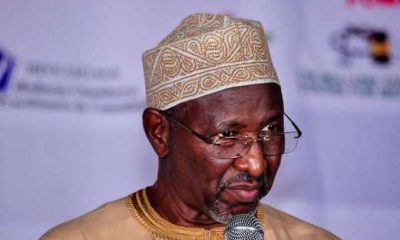Headlines
Naira falls over 91% under Tinubu, experts say it could get worse

By OBINNA EZUGWU
Only a few years ago, N1000 got you over 1,500 CFA, which made Nigeria a destination of choice for artisans from neighboring Francophone countries, but today, the Nigerian currency has so taking a beaten that 1,000 CFA exchanges for N1,800.
The naira, which had continued on a downward spiral in the open market since the administration of President Bola Tinubu opted to float it in its initial days, took intense bashing last week, before settling at N1250 to the dollar on Sunday, a record drop, with attendant upheaval for an economy seemingly on life support.
And analysts warn it could yet get much worse if local production does not improve in the short to long term, an almost impossible scenario.
“What is the wisdom in spending billions defending the naira when it continues to fall instead of investing in genuine manufacturers and exporters of high-value products that would earn Nigeria foreign income and more?” wondered Olusegun Aganga, former minister of finance at the 3rd Adeola Odutola lecture in Abuja on Thursday.
Aganga warned that the local currency, which has lost as much as 91% percent of its value – in the open market – since Tinubu took over on May 29th, the worst performing currency on the continent, according the World Bank, could yet see worse days. And in an economy that imports basic items, from toothpicks to matchsticks and everything in-between, the effect on inflation has been intense.
“The naira is losing value and falling. Dollarization will become an option, noted Dr. Aloy Chife, @ChifeDr, a tech engineer, entrepreneur and public affairs commentator. “The pitfalls of sustained periods of low growth, high inflation, weak currency and instability in exchange rates.When it rains it pours. Gird yourself.”
September inflation came in at 26.72%, a 0.92% increase from the 25.80% recorded in August, and an overall 11 percentage spike since Tinubu took over; on the back of not just the falling naira, but also the increase in fuel pump price in the wake of the withdrawal of fuel subsidy, yet worsened by insecurity, which has made food production a dangerous undertaking for many rural farmers, and poor road infrastructure that makes transportation of goods even more difficult.
The latest inflation figure, however, is below what many analysts had projected, but debates continue as to whether the official figures are a true reflection of the numbers in the market. In Nigeria today, many households struggle to get by. Disposable income has been wiped out, and for millions, daily bread is now luxury.
“(I receive) daily WhatsApp messages from people, who ought to be ok. People are desperate and destitute,” said Chife. Sharing one of the messages he received, he quoted: “Gud evinin Doc, how are you with your family; we are here suffering nd crying under Jagaban govt with the exchange rate now @ #1,050 per dollar. Dr Aloy this is the worst govt ever in this country since independence, even till tomorrow. People are really suffering in this country now, even more than the Nigeria/Biafra civil war, though we were far younger then.”
For rots that took roots during the years of President Muhammadu Buhari, the former Lagos State governor insists he inherited an economy in a bad shape, while promising time and again, that things would get better. The ongoing suffering, he says, are momentary pains, which the people should bear for the greater good.
“We will do our best, and our economy will get better for the benefit of Nigerians,” the president told Southwest Muslim leaders on Friday. “I am very sure of that, and we are putting in the work to ensure that.”
Not many would disagree with the Nigerian leader about the economy he inherited, and many analysts agree that floating of the naira had become necessary because, as Kalu Aja, a financial expert put it, “we can no longer afford a peg.”
Similar arguments have also been adduced to support the withdrawal of fuel subsidy, which was costing the country a fortune yearly and had become unsustainable. But the counter argument is that the Tinubu administration has carried out the reforms shoddily, and without proper plans on how to cushion their effects, and even some of the supporters of the new president admit that they never expected things to get this bad so quickly.
“The rate of inflation spiked due to some ill-advised policy decisions, which were not appropriately sequenced,” argued Dr. Boniface Chizea, TMD/CEO BIC Consultancy Services. The sudden removal of fuel subsidy was not advisedly handled.”
According to Chizea, ‘There is no factor cost guaranteed to cost a spike in the rate of inflation as allowing the pump price of fuel to suddenly go up and at that rather steeply. Yes subsidy on fuel is bad news for the country because it is simply a misallocation of resources and what is even of greater concern is that the intended beneficiaries do not get its benefits. We ended up in the process subsidizing middle men.
“A preferred policy choice in the circumstances would have been to move quickly to end importation and, therefore, banish the word fuel subsidy from our lexicon. And that might not be as farfetched as we might think. We just needed to quicken efforts to get the Dangote Refinery, which has been since commissioned in May 22, 2023 to start production and that would displace the need to go on importing petrol.”
The former banker also observed that, “The other matter which worsened the inflationary spiral is the ill-informed announcement that we are going to merge the exchange rates in the country. Realistically there are hardly any countries in the world where the rate is the same across board.”
Meanwhile, many have been quick to point out that while the president continues to preach the need for Nigerians to bear the pains, he has not made the slightest effort to practice what he preaches, as he still lives the extravagant lifestyle that has come to be associated with his office.
The presidential Air Fleet (PAF), comprising of two Agusta Westland AW189 Helicopters, two Falcon 7X, one Bombardier Challenger 605, one Boeing Business Jet 737-800, one Falcon 900, one Hawker Sidley 4000, one Gulfstream G500, and one Gulfstream G550, is still maintained, with the president’s son, Seyi casually using one jet to fly to Kano to watch a polo tournament.
Abubakar Abdulahi, the Commandant of the PAF, had disclosed in December 2022, that, “the cost of maintaining each aircraft ranges between $1.5 million to $4.5 million depending on the level of maintenance.”
The president had also named a bloated cabinet of 48 ministers – estimated to gulp N8.63 billion in salaries and allowances in four years – with retinue of aides at a time the country is supposed to be be broke. Meanwhile, in the same economy, where the people are told to sacrifice, lawmakers have budgeted N57.6bn for the purchase of SUVs for each member of the house of representatives, at about N160m each.
Yet, an investigate journalist, @pidomnigeria had last week, shared documents allegedly showing that the presidency spent as much as $500,000 on hotel reservations and other expenses for the president and his aides during the recently held United Nations General Assembly in New York.
“The optics have been terrible,” said Opeyemi Folorunsho, a Lagos based analyst. “Yes, we can talk about how Buhari destroyed the economy, but what has Tinubu done to resuscitate it other than subjecting the masses to suffering while himself and his cronies live large? They are not making any sacrifices. They have only come to enjoy because it’s their turn. No president, who is serious about rescuing the economy will appoint the huge cabinet, for example.”
The president’s policy flip-flops – which had seen subsidy withdrawn and then returned, and naira floated, then defended, among others, observers say, are also eroding confidence.
“The fact is that the exchange rate has not been able to achieve some level of stability. Because, for economic agents, it doesn’t really matter what the rate is for many of them; what matters most is that it must be able to create some level of stability,” said Mr. Johnson Chukwu, the Group Chief Executive Officer of Cowry Assets Management, at a presentation recently. “Because if you have that level of instability, you will create uncertainties, and because of those uncertainties, we are leading to a loss of confidence or panic that has actually set in.”
On the political front, too, Tinubu appears out of grasp and not fully in control. The sudden withdrawal, last week, of the appointment of 24-year-old Engr. Imam Kashim Imam as the chairman of the Board of Directors of the Federal Roads Maintenance Agency (FERMA), is the latest of the series of actions that betray a lack of coordination within the presidency.
Tinubu’s appointment of ministers was shoddily done, too, such that one of the nominees, Maryam Shetty only learnt that her nomination had been withdrawn while waiting at the National Assembly complex for screening.
Yet, at the end of the screening process that initially saw 48 nominees screened, the Senate confirmed only 45 of the 48, with Nasir El-Rufai, former Kaduna State governor; former deputy governor of Taraba State, Senator Abubakar Danladi, and Stella Okotete from Delta State, failing to be cleared because they had, as Senate president, Godswill Akpabio, claimed, security reports that had to be sorted out.
Regardless, security clearance are typically obtained before nominees are forwarded to the senate.
“I’ve had the privilege of working with him (Tinubu). I was both in AC and ACN, but I’m honestly disappointed,” said political activist and former member of the House of Representatives, Usman Bugaje. “I expected much from him, sadly, the magic has disappeared. The idea that he’s a person who can solve problems is not there. We’re tumbling and fumbling.”
Bugaje, a former presidential aspirant, who spoke on Channels TV Politics Today on Friday continued, “Appointments are given and withdrawn. It does appear that the president does not even know when the appointments are made. I will say it’s sheer incompetence. He comes around as someone who has no idea about what he should be doing, and that’s why he’s embarrassing the country.”
The president is also creating tension in the polity with his appointments, which have tended to favour his native Southwest to the detriment of other regions. As it stands, the Southwest controls the country’s entire security and economic architectures, with people from the zone heading the military, police, CBN, FIRS, Customs, Immigration, Bank of Industry, among others, as well as such key ministries as finance, justice, petroleum, power, justice and so on.
“Tinubu is filling the commanding heights of the economy and national affairs with his Yoruba kin, like Buhari did with his,” observed Dr. Chife. “We can all now clearly see one Nigeria for what it is. To build a nation you need cohesion and consensus. Union is not the same thing as Unity.”
Tinubu’s appointments will increasingly alienate other parts of the country, which analysts say would make the job of rebuilding the country difficult because there will be lack of trust and a sense of alienation.
“The thing is that as a leader, when you begin to practice exclusion or you begin to favour one part of the country over the others, you are creating a problem for yourself,” said Bugaje. “Nobody is going to trust what you do or believe what you say. You are going to be viewed as a chauvinist and the people you excluded are going to fight back.”









